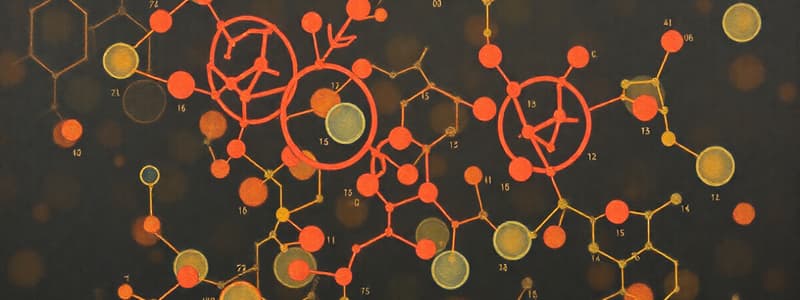Podcast
Questions and Answers
What initiates the biosynthesis of heme?
What initiates the biosynthesis of heme?
- Bilirubin and biliverdin
- Uroporphyrinogen and enzymes
- Albumin and erythrocytes
- SuccinylCoA and glycine (correct)
Which compound accumulates due to defects in heme biosynthesis?
Which compound accumulates due to defects in heme biosynthesis?
- Bilirubin
- Uroporphyrinogen (correct)
- Biliverdin
- Heme oxygenase
What effect does uroporphyrinogen accumulation have on urine?
What effect does uroporphyrinogen accumulation have on urine?
- It becomes bright yellow.
- It remains unchanged.
- It becomes completely colorless.
- It turns purple to dark purplish. (correct)
What is the function of heme oxygenase in heme degradation?
What is the function of heme oxygenase in heme degradation?
What potential craving might occur due to porphyrias?
What potential craving might occur due to porphyrias?
What is the precursor for the biosynthesis of glutamine?
What is the precursor for the biosynthesis of glutamine?
Which form of vitamin B6 is crucial for transamination reactions?
Which form of vitamin B6 is crucial for transamination reactions?
Which amino acid is synthesized from the pyruvate precursor?
Which amino acid is synthesized from the pyruvate precursor?
What is the role of PLP in amino acid synthesis?
What is the role of PLP in amino acid synthesis?
Which of the following amino acids is classified as non-essential in mammals?
Which of the following amino acids is classified as non-essential in mammals?
Which biosynthetic family does proline belong to based on its precursor?
Which biosynthetic family does proline belong to based on its precursor?
Which amino acid is synthesized from ribose 5-phosphate?
Which amino acid is synthesized from ribose 5-phosphate?
Which metabolic pathway does serine originate from?
Which metabolic pathway does serine originate from?
What is the primary pigment of urine, which is derived from bilirubin degradation?
What is the primary pigment of urine, which is derived from bilirubin degradation?
Which condition is most commonly associated with jaundice due to bilirubin accumulation?
Which condition is most commonly associated with jaundice due to bilirubin accumulation?
What role does UDP-glucuronosyl transferase (UDPGT) play in bilirubin metabolism?
What role does UDP-glucuronosyl transferase (UDPGT) play in bilirubin metabolism?
What is the initial substrate for de-novo purine synthesis?
What is the initial substrate for de-novo purine synthesis?
What inhibits the rate-limiting enzyme in purine biosynthesis?
What inhibits the rate-limiting enzyme in purine biosynthesis?
In pyrimidine biosynthesis, what is the first step in synthesizing the pyrimidine ring?
In pyrimidine biosynthesis, what is the first step in synthesizing the pyrimidine ring?
Which of the following products is a result of the intestinal microbiota acting on bilirubin degradation?
Which of the following products is a result of the intestinal microbiota acting on bilirubin degradation?
What is the significance of light in phototherapy for infant jaundice?
What is the significance of light in phototherapy for infant jaundice?
What is the role of ribonucleotide reductase in nucleotide metabolism?
What is the role of ribonucleotide reductase in nucleotide metabolism?
Which anticancer drug inhibits thymidylate synthase?
Which anticancer drug inhibits thymidylate synthase?
What is the result of a total lack of hypoxanthine-guanine phosphoribosyl transferase (HGPRT)?
What is the result of a total lack of hypoxanthine-guanine phosphoribosyl transferase (HGPRT)?
What is the final product of the oxidation of hypoxanthine and xanthine?
What is the final product of the oxidation of hypoxanthine and xanthine?
Which enzyme is responsible for converting dihydrofolate (DHF) to tetrahydrofolate (THF)?
Which enzyme is responsible for converting dihydrofolate (DHF) to tetrahydrofolate (THF)?
What condition is primarily caused by excess uric acid in the human body?
What condition is primarily caused by excess uric acid in the human body?
Which of the following foods should be avoided to help treat gout?
Which of the following foods should be avoided to help treat gout?
What type of drugs are allopurinol and febuxostat classified as in the treatment of gout?
What type of drugs are allopurinol and febuxostat classified as in the treatment of gout?
What enzyme deficiency is associated with gout, particularly in the salvage pathway?
What enzyme deficiency is associated with gout, particularly in the salvage pathway?
Which compound is produced from the catabolism of pyrimidines?
Which compound is produced from the catabolism of pyrimidines?
Which of the following CNS active compounds is synthesized from amino acids?
Which of the following CNS active compounds is synthesized from amino acids?
What is the primary source of ammonia in amino acid biosynthesis?
What is the primary source of ammonia in amino acid biosynthesis?
What role does porcine uric acid oxidase play in the treatment of gout?
What role does porcine uric acid oxidase play in the treatment of gout?
Flashcards
Glutamine synthesis
Glutamine synthesis
Glutamine is produced from glutamate through a two-step process catalyzed by glutamine synthetase.
Transamination
Transamination
A process transferring an amino group from one molecule to another, creating non-essential amino acids.
Non-essential amino acids
Non-essential amino acids
Amino acids that the body can synthesize from simpler compounds.
Essential amino acids
Essential amino acids
Signup and view all the flashcards
Pyridoxal Phosphate (PLP)
Pyridoxal Phosphate (PLP)
Signup and view all the flashcards
Metabolic Precursors
Metabolic Precursors
Signup and view all the flashcards
Amidotransferases
Amidotransferases
Signup and view all the flashcards
Biosynthesis of amino acids
Biosynthesis of amino acids
Signup and view all the flashcards
Porphyrias
Porphyrias
Signup and view all the flashcards
Heme biosynthesis
Heme biosynthesis
Signup and view all the flashcards
Bilirubin
Bilirubin
Signup and view all the flashcards
Heme oxygenase
Heme oxygenase
Signup and view all the flashcards
Biliverdin
Biliverdin
Signup and view all the flashcards
Ribonucleotide Reductase
Ribonucleotide Reductase
Signup and view all the flashcards
Thymidylate Synthase
Thymidylate Synthase
Signup and view all the flashcards
What are the anticancer targets for dTMP synthesis?
What are the anticancer targets for dTMP synthesis?
Signup and view all the flashcards
What is the salvage pathway?
What is the salvage pathway?
Signup and view all the flashcards
What is Lesch-Nyhan Disease?
What is Lesch-Nyhan Disease?
Signup and view all the flashcards
Urobilin
Urobilin
Signup and view all the flashcards
Jaundice
Jaundice
Signup and view all the flashcards
What is the role of UDPGT in bilirubin metabolism?
What is the role of UDPGT in bilirubin metabolism?
Signup and view all the flashcards
De Novo Purine Synthesis
De Novo Purine Synthesis
Signup and view all the flashcards
Rate-limiting step in purine synthesis
Rate-limiting step in purine synthesis
Signup and view all the flashcards
Pyrimidine Synthesis
Pyrimidine Synthesis
Signup and view all the flashcards
What is the role of aspartate and carbamoyl phosphate in pyrimidine synthesis?
What is the role of aspartate and carbamoyl phosphate in pyrimidine synthesis?
Signup and view all the flashcards
Gout
Gout
Signup and view all the flashcards
Uric Acid Catabolism
Uric Acid Catabolism
Signup and view all the flashcards
Xanthine Oxidase (XO)
Xanthine Oxidase (XO)
Signup and view all the flashcards
Purine catabolism
Purine catabolism
Signup and view all the flashcards
Allopurinol (Zyloprim)
Allopurinol (Zyloprim)
Signup and view all the flashcards
Febuxostat (Uloric)
Febuxostat (Uloric)
Signup and view all the flashcards
Pyrimidine Catabolism
Pyrimidine Catabolism
Signup and view all the flashcards
Thymine Degradation
Thymine Degradation
Signup and view all the flashcards
Study Notes
Amino Acid and Nucleotide Biosynthesis
- Biosynthesis involves multiple steps, starting from precursors like glucose, 3-phosphoglycerate, phosphoenolpyruvate, and pyruvate.
- Various amino acids are synthesized from these intermediates, including tryptophan, phenylalanine, tyrosine, alanine, valine, leucine, isoleucine, etc.
- The citric acid cycle and pentose phosphate pathway are also involved in the process.
- Bacteria can synthesize all 20 amino acids, while mammals require some from their diet.
- Non-essential amino acids are made from ammonia and keto acids via transamination.
- Transamination reactions utilize pyridoxal phosphate (PLP), an active form of vitamin B6.
Ammonia Incorporation
- Glutamine is formed from glutamate in a two-step enzymatic process using glutamine synthetase.
- Glu phosphorylation creates a good leaving group, enabling ammonia substitution.
Biosynthesis of Special Amino Acids, Biogenic Amines, and CNS-Active Compounds
- Some amino acids are crucial building blocks of biogenic amines and central nervous system (CNS) active compounds.
- These include tyrosine, tryptophan, and histidine.
- These compounds are decarboxylated using PLP-dependent enzymes.
Biosynthesis of Porphyrins
- Porphyrin biosynthesis begins with succinyl CoA and glycine.
- The process leads to the formation of porphyrins, including heme.
- Enzyme deficiencies during this pathway can cause porphyrias.
Defects in Heme Biosynthesis and Porphyrias
- Mutations or malfunctions in heme biosynthesis enzymes cause porphyrias.
- Precursors accumulate in blood cells, body fluids, and liver tissue.
- Porphyrias are associated with urine discoloration, teeth fluorescence under UV light, and skin sensitivity to UV light.
Heme Degradation and Bile Pigments
- Degradation of heme produces biliverdin, a green compound.
- Biliverdin is converted to bilirubin, a yellow compound.
- Bilirubin travels through the bloodstream, bound to serum albumin.
- Bilirubin is further broken down into urobilin and stercobilin.
- Accumulation of bilirubin leads to jaundice.
Purine Biosynthesis
- A sugar (PRPP) and multiple units are added to form a complete nucleotide.
- Glutamine-PRPP amidotransferase is a rate-limiting step, inhibited by certain anticancer drugs like 6-mercaptopurine and 6-thioguanine.
Pyrimidine Biosynthesis
- Pyrimidine synthesis begins with the creation of the pyrimidine ring (orotate) followed by attachment to ribose-5-phosphate.
- Aspartate and carbamoyl phosphate provide the atoms for the ring structure.
- UMP is phosphorylated to UTP, and UTP can be converted to CTP.
Ribonucleotides to Deoxynucleotides
- The 2' carbon hydroxyl group on ribonucleotides is directly reduced to a 2' hydrogen via ribonucleotide reductase.
- The reducing agent is NADPH using glutathione and FAD.
- Reduction happens to NDPs.
dTMP from dUMP
- Thymidylate synthase catalyzes the reaction to convert dUMP to dTMP.
- 5-fluorouracil and other drugs target thymidylate synthase for anticancer therapies.
Pyrimidine and Purine Degradation
- Nucleases degrade DNA and RNA into nucleotides.
- Excess nucleotides undergo catabolism through specific pathways (salvage).
- Hypoxanthine-guanine phosphoribosyltransferase (HGPRT) is essential for re-using purine bases.
- A deficiency in HGPRT causes Lesch-Nyhan syndrome.
- Purines are degraded to uric acid, while pyrimidines generate NH4+ and urea, along with CAC intermediates like succinyl CoA.
Excess Uric Acid and Gout
- Excess uric acid causes gout (sodium urate crystal deposits in joints, usually toes).
- Treatment options include avoiding purine-rich foods and using xanthine oxidase inhibitors like allopurinol.
- Other therapies involve administering porcine uric acid oxidase.
Overview Summary
- Many metabolic pathways are involved in amino acid and nucleotide biosynthesis.
- Defects in these pathways can result in various diseases.
- The degradation of these molecules is also important for proper cellular function.
Studying That Suits You
Use AI to generate personalized quizzes and flashcards to suit your learning preferences.




